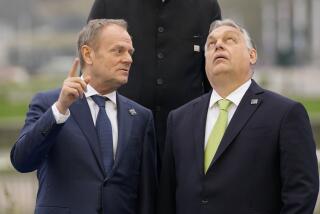Europeans Foot Bills but Get No Respect : Mideast: Trying to mediate in Arab-Israeli talks, the biggest givers to Palestinian Authority get rebuffed.
- Share via
JERUSALEM — Tired of being asked to pay the bills but gaining little influence in Middle East peacemaking in return, the European Union is seeking to break the current stalemates in negotiations between Israel and its Arab neighbors but has found itself rebuffed once again as a mediator.
French Foreign Minister Alain Juppe, leading a European Union delegation to the Middle East, expressed the bloc’s anguish and frustration Thursday after inconclusive meetings with Israeli Prime Minister Yitzhak Rabin and PLO Chairman Yasser Arafat.
In the European view, the peace process is stalling dangerously, Juppe told Rabin and Arafat. The delegation urged them to resolve such issues as continued attacks on Israelis and expansion of Jewish settlements in the West Bank.
“The peace process today is in a very critical period,” Juppe told a news conference. “The enemies of peace have not laid down their arms. We knew it would be a difficult course, but there are so many pitfalls. Yet interrupting the peace process would bring disaster in the region and generally for world peace.”
The European Union, he continued, believes that it could and should play a more active role diplomatically, economically and culturally in overcoming the years of hostility between Jews and Arabs in the region.
“We come to support you,” Juppe said. “If you want us, we are ready to help, and we have the feeling that people do want this.”
Yet there was also the perception among Western diplomats that the European Union, with France as its current president, is searching for diplomatic arenas where it can make a difference--and finding that difficult.
“The European Union has achieved very little in any of the European theaters--conflicts in the former Yugoslavia, conflicts in Russia or the former Soviet Union, the enlargement of NATO or of the European Union itself,” a European ambassador said. “In the Middle East, there is still a chance of doing something, of making a difference through diplomacy.”
But Israel was openly annoyed with the European intervention, perceiving it as too critical of Israeli actions and too sympathetic to the various Arab positions.
European advice on peace negotiations “leaves a bad taste,” said Ori Orr, a senior Labor Party lawmaker. “There is a big argument between us and the Europeans,” Orr added, referring to the European Union’s view that Jerusalem, claimed as a capital by both Israel and the Palestinians, is an open question to be resolved in future negotiations with the Palestine Liberation Organization.
The English-language Jerusalem Post declared in a blunt editorial Thursday that the European delegation is “in Israel to bully the government.”
“It would be easier to listen to the Europeans had they come with clean hands,” the paper added, alleging that Europe had armed and aided Israel’s Arab enemies for a long time.
*
Many Israelis were incensed by the delegation’s meeting with local Palestinian leaders in Orient House in Arab East Jerusalem in addition to the discussion with Arafat at his office in Gaza City.
About 30 right-wing Israelis jeered and demonstrated outside Orient House as the delegation paid what it described as “a courtesy call.”
“Jerusalem is Jewish and will remain Jewish for eternity,” one demonstrator’s placard declared. Another said, “After Hitler, you have done enough--stay home!”
The Palestinians said they found the Europeans “more neutral” than the United States, but Arafat reportedly waved away their specific criticisms about the use of aid funds, saying “this is not the main issue today.”
“Gaza is neither Brussels nor Strasbourg,” a senior Arafat aide said after the meeting with the delegation, “and the politics of Europe . . . do not and cannot extend to the Middle East. . . . We must, and we will, do it our way.”
Juppe still reminded Israelis and Palestinians alike that “the promises of the European Union (for assistance) are kept.”
The bloc had committed $345 million to help the Palestinian Authority this year, he said, and it had already paid $100 million. Without these funds, he added, Palestinian police would not be paid and the whole administration would stop.
The European Union is the biggest donor to the Palestinian Authority. Yet European diplomats regularly complain that little attention is paid to their views.
More to Read
Sign up for Essential California
The most important California stories and recommendations in your inbox every morning.
You may occasionally receive promotional content from the Los Angeles Times.













